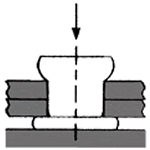
Solid Rivets
| Material | Shank Diameter (mm) | |||||||
3 |
4 |
4.8 |
6 |
6.35 |
7 |
8 |
10 |
|
| STEEL | ||||||||
| ALUMINIUM | ||||||||
| COPPER | ||||||||
| BRASS | ||||||||
| STAINLESS STEEL | ||||||||
Plating |
Zinc, Nickel |
Head Shapes
Mushroom |
|
Oval |
|
Flat |
|
CSK |
|
Round |
|
On your mobile, drag the table below to the left and right to see the information.
Recommended Rivet Length |
|
| Shank diameter (mm) |
Rivet length (mm) |
| 3.0 4.0 4.8 6.0 8.0 10.0 |
Material thickness + 3.0mm Material thickness + 4.0mm Material thickness + 4.8mm Material thickness + 6.0mm Material thickness + 8.0mm Material thickness + 10.0mm |
| (A guide only) | |
Hole Size |
|
| Shank diameter (mm) |
Hole Size (mm) |
| 3.0 4.0 4.8 6.0 8.0 10.0 |
3.1 4.1 4.9 6.1 8.1 10.1 |
Solid Impact Riveting:

In solid impact riveting, a compressive axial load is applied to the end of the rivet shank. This causes the rivet shank to swell throughout its length as it shortens under the load.

The rivet shank continues to expand until the hole in the parts being assembled restrict it from further expansion.
The unrestricted rivet end then expands, forming the rivet clinch.

This is an excellent method of permanently assembling solid materials, as shown in the above sequence. During impacting there is substantial force being applied by the expanding rivet shank on the parts being assembled.
Impact solid riveting is a very popular assembly method in bed frames, shelving, automotive structural component assembly, stamping assembly - anywhere that solid materials are being permanently assembled.






